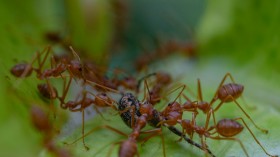Furry coral crabs are helping Great Barrier Reef corals to combat white syndrome disease, reveals a new study.
White syndrome is a deadly disease that causes coral tissue to disintegrate. Until now, crabs were blamed for the spread of the disease in coral reefs. But a new study by researcher Joseph Pollock and his colleagues from James Cook University, Australia, has found that the furry coral crabs are actually helping the corals by slowing down the disease progression.
"Researchers originally speculated that they may actually cause the disease, since diseased colonies have high numbers of crabs and it is known that these crabs can eat coral tissue," Pollock said in a statement.
"I have been doing a number of assays to determine the cause of this disease and it didn't seem that the crabs could cause the amount of destruction you see with this disease, in which the coral tissue essentially just falls off of the coral skeleton," he said.
Pollock said that the crabs are actually slowing the disease progression. However, it is not yet clear as to how the crabs slows its progress. He suspects that the method could be similar to maggot debridement therapy, an ancient medical treatment still in use today.
The researcher, who been studying white syndrome coral disease at Lizard Island, 150 miles north of Cairns, collected healthy and diseased coral colonies from the field. He manipulated the crab numbers and observed the fragments for three weeks. He found that the disease had a major impact on the coral reefs. The white syndrome causes the coral tissue to fall off the skeleton, resulting in the coral reefs getting damaged.
Pollock and his research team also found that the crabs were strongly attracted to reef colonies that were hit by white syndrome disease. This could mean that crabs from nearby colonies are migrating to infected coral colonies, in a bid to slow the progression of the disease.
"This could be a very interesting feedback mechanism whereby these crabs help to slow coral disease on reefs," Pollock said.
© 2024 NatureWorldNews.com All rights reserved. Do not reproduce without permission.
![Extreme Heat Wave in Africa’s Sahel Region That Killed 100 People Linked to Climate Change [Study]](https://1471793142.rsc.cdn77.org/data/thumbs/full/70226/280/157/50/40/extreme-heat-wave-in-africa-s-sahel-region-that-killed-100-people-linked-to-climate-change-study.jpg)




